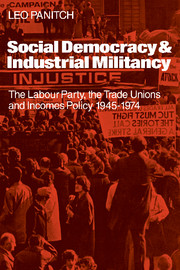 Social Democracy and Industrial Militiancy
Social Democracy and Industrial Militiancy Book contents
- Frontmatter
- Contents
- Preface
- List of Abbreviations
- Introduction
- 1 The 1945 Labour Government: the mixed economy and wage restraint
- 2 Incomes policy and Labour in opposition
- 3 The voluntary incomes policy agreement
- 4 The devaluation of voluntarism
- 5 The politics of wage freeze
- 6 The statutory incomes policy – Labour Government versus labour movement
- 7 ‘In place of strife’
- 8 Industrial militancy and political stagnation
- Conclusion
- Appendixes
- Notes
- Index
8 - Industrial militancy and political stagnation
Published online by Cambridge University Press: 07 October 2011
- Frontmatter
- Contents
- Preface
- List of Abbreviations
- Introduction
- 1 The 1945 Labour Government: the mixed economy and wage restraint
- 2 Incomes policy and Labour in opposition
- 3 The voluntary incomes policy agreement
- 4 The devaluation of voluntarism
- 5 The politics of wage freeze
- 6 The statutory incomes policy – Labour Government versus labour movement
- 7 ‘In place of strife’
- 8 Industrial militancy and political stagnation
- Conclusion
- Appendixes
- Notes
- Index
Summary
The Reassertion of incomes policy
The struggle over In Place of Strife brought to a head the contradiction between the dominant class harmony ideology of the Labour Party and contemporary militant trends in the British trade union movement. The resolution of the immediate issue of the penal clauses in the unions' defensive victory of June 1969 did not, however, resolve the underlying contradiction. Indeed in its last year in office, at the very time that the trade union movement was embarking on a period of wage militancy unknown since the early 1920s, the Labour Government remained not only committed to an incomes policy, but to one that contained exactly those statutory and penal elements which had led to Frank Cousins' resignation from the Cabinet in July 1966, before the wage freeze. The political formula arrived at between the General Council and the Labour leadership in June 1969, designed as it was to re-establish the Labour leadership's legitimacy's vis-à-vis the labour movement, gave the Labour Government the opportunity of restoring its control over the PLP and NEC, of sustaining its independence from the decisions of the Labour Party Conference, and of securing the necessary financial and vocal support from the trade union leadership to enable it to fight the 1970 election effectively. The new element in the situation, however, was that the re-establishment of the political solvency of the Labour Party had little or no immediate effect on the industrial behaviour of the organized working class.
- Type
- Chapter
- Information
- Social Democracy and Industrial MilitiancyThe Labour Party, the Trade Unions and Incomes Policy, 1945–1947, pp. 204 - 234Publisher: Cambridge University PressPrint publication year: 1976


